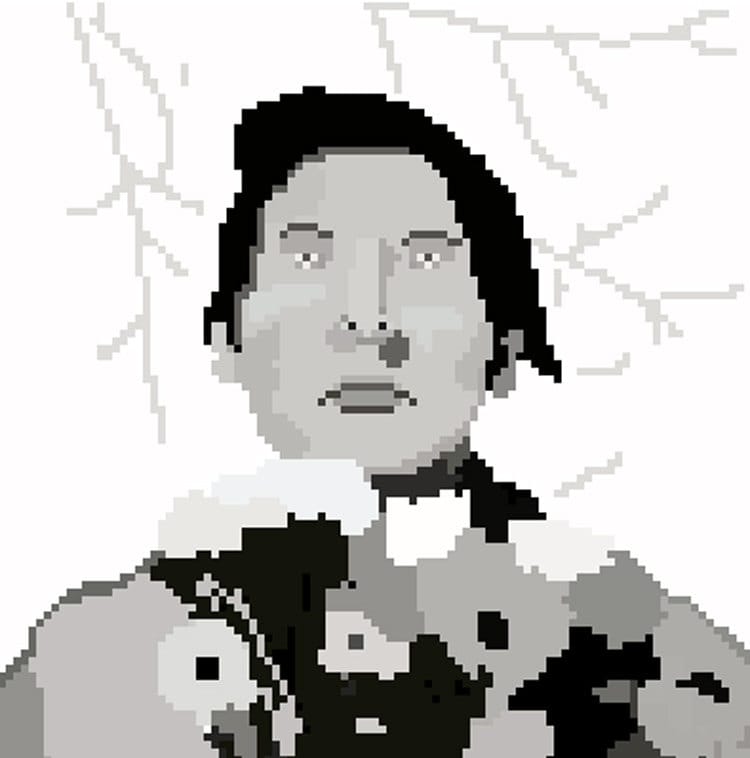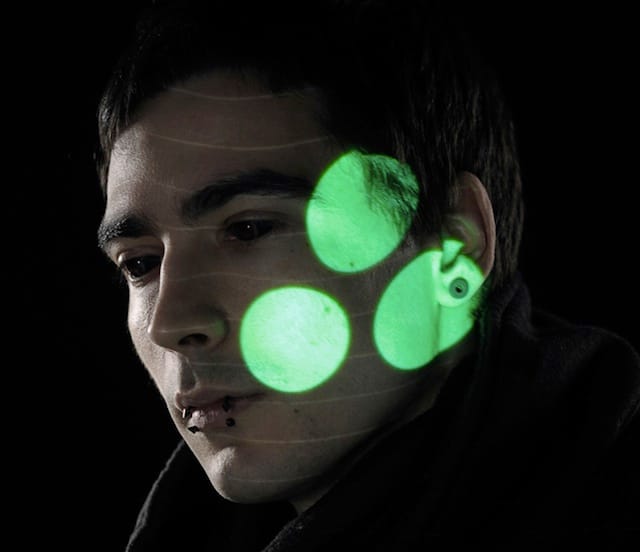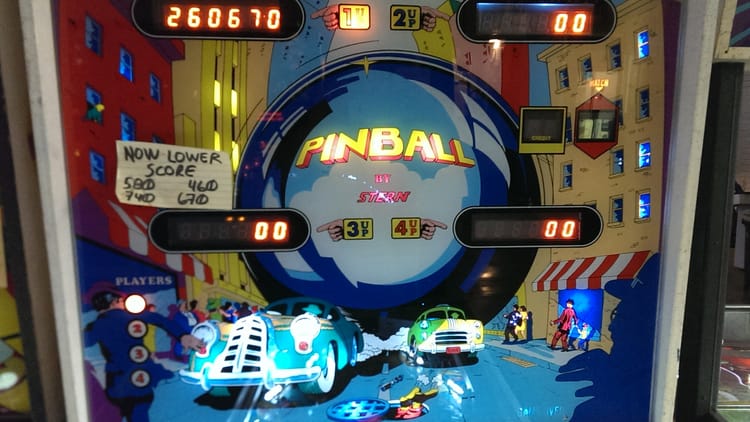Profile: Matt Thorson

Matt Thorson was 16 when he created Ogmo, the endearingly pathetic protagonist of 2004 hyper-difficult platformer Jumper, playable in the curiously reminiscent Super Meat Boy. With a degree in computer science, an EP released with his band Gorgon Horde, and Adult Swim Games hits Give Up, Robot, Give Up, Robot II, and Fat Wizard under his belt, Thorson has established himself as a professional artist and game maker. Thorson spoke to us about what his peculiar and influential videogame design style means to him, why minimalism and difficulty show up so often in his work, his thoughts on Super Meat Boy, and how we can all train ourselves to be inspired.
/ / /
I’ve noticed there’s a lot of metaphor imbued in your games, without much text or much exposition. Is that something you worry about—deriving meaning from, I suppose, just the sensation of the gameplay?
Yeah, it definitely is. I’m not sure why. It’s definitely a goal of mine to make games that the player thinks about after they play them, or just games that are memorable even if they don’t provoke that much thought.
Give Up, Robot, and Give Up, Robot 2 sort of have concrete themes, and Fat Wizard does especially. I made that game with a friend, Chevy Ray [Johnston], and he’s really good at creating a universe. But my earlier games, before I got good at creating that universe, had more of that vague feeling—like FLaiL, or even An Untitled Story, where partially I just couldn’t make the world feel complete so the best way to do it was to just leave it to the player’s imagination. And I think it worked to their advantage.
I still will use visuals and audio as a helper for [meaning]. But I definitely want to that with gameplay. I think that’s the direction my work has been going, and I sort of want to push that more.
Is there anything in particular that inspires you? Or does inspiration strike you randomly?
I think I know one thing that inspires me, and it’s when I have a level editor open and I can just design spaces—I really like that. I think architecture is a big part of game design for me. Just building spaces. I find it really hard to work on game designs that don’t involve traversing a space in some way, where I can’t build architecture for it.
I listened to a Jonathan Blow talk recently—the talk wasn’t about [game spaces] at all—but somebody asked him what Braid was about, and he said it was about these axioms he had of how the world works. Like, “In one world, time works this particular way”—and then he used that axiom to try to find interesting things, and then show the most interesting ones to the player. And I think that’s what design’s like for me; the axioms for Jumper are that you can jump and double jump, and move left and right. It’s about trying to build interesting spaces around those constraints. And I know that I work best with constraints, which is probably another reason for the minimalism [in my games].
Playing in a band definitely changed my music composition style—I’m not sure if it’s related, but an idea I guess I have is to design the pacing of a game sort of like an album. It’s hard to tell how that stuff affects me because it’s so subtle. I know it must, but it’s hard to pick apart.
The main thing I want to play with: I really like how music gets a flow going. With a good song you can anticipate the verse, chorus, verse—you can anticipate the flow. You kind of know what’s coming next. That’s something that music can give to games, I think—to make the player feel like they’re flowing through the game, like they’re on a roll. To make them start to see the structure of the game and how the objects interact with each other.
That’s something I think I need to work on—just sort of finding out where my inspiration comes from and harvesting it. People talk about creativity like it’s some magical force that has its own whims. I think that’s wrong, personally. I’m almost certain it’s an internal force that you can control if you learn how. You can train yourself to be creative. You can’t, obviously, turn it on and off all the time, but you can start to recognize what makes you feel creative, what makes you feel inspired, and you can work toward entering that mental state. Making art for a living, that’s just something I need to work at. I don’t really know right now what inspires me. I know I like to listen to music, read books, just appreciate other art between projects; maybe because it distracts me, maybe because it helps inspire me.
It’s sort of a spiritual way to look at creativity, as a thing with its own whims. It’s as if to say some god somewhere is controlling it. Whereas training yourself seems more scientific.
They’re sort of spiritual in opposite directions. One is spiritual in the sense that God decides it’s time for you to have an idea. The other is spiritual in, I guess, the sort of Buddhist “wholeness” notion. The idea is inside you, but you are inside the universe. Your ego really is nothing, which is kind of a depressing notion sometimes [laughs].
I feel that the best way to see creativity is as this sort of machine inside you which you can turn on. Sometimes it can be difficult to turn on, but when you do, it just generates ideas. I don’t like the idea of creativity as some external force that once in a while feels like putting an idea in your head. Maybe I just don’t like it because it’s not practical—as someone who makes money off of art [laughs].
“People talk about creativity like it’s some magical force that has its own whims. I think that’s wrong, personally. I’m almost certain it’s an internal force that you can control if you learn how. You can train yourself to be creative.”
There is strong sense of minimalism and difficulty in many of your games, which sort of hearken back to a retro style of gaming. Is the minimalism out of an artistic consideration or is it from practical or technological limitations?
I think it’s a little bit of both. Playing old Mario games, I didn’t even think about the story. Mario does have a story but it’s pretty dumb. The meaning of it, for me, came from the fact that as I was playing I was making up the narrative. If I died, I would imagine, “Oh, Mario’s having a hard time with this part of his quest.” Not having a story—or having pieces of a story and the player fills it in with their experience—it’s sort of the whole school of “the story of the game is the story of the player playing the game.”
But it’s also definitely a practical thing. Maybe I didn’t know it at the time, but when I was 16, if I had tried to make a role-playing game there’s no way I could have done it, whereas Jumper was something I could have made.
Do you think the minimalism and the difficulty work in a symbiotic way?
They probably do. I think minimalism works well with difficulty because there’s no noise. When you fail, you’re not blaming anything but yourself. That’s something Super Meat Boy worked on a lot too. When you fail, it’s your fault, and you know it’s your fault. And I think minimalism is a really good way to achieve that.
This recalls some of your games—especially with something like Jumper—where you have this very confined space. It’s not just visually minimalistic but the space itself is confined to one stage. You start to recognize avenues and possibilities for how to get through that puzzle.
I think you also start to just recognize patterns in the gameplay when you get into the zone like that. I think that’s something I learned from Donkey Kong Country 2. That game uses patterns really well. Just build trust with the player by using patterns, and then they start to recognize the patterns.
Our brains are very good at recognizing patterns. I think it’s really good way to teach players in games to use patterns, and to never break the trust with the player by breaking those patterns. Use symmetry and patterns to get the player to trust the game, and they’ll start to eventually get better.
Unlike something like, perhaps, Ghosts and Goblins.
Right. People call my games masocore, which—I’m not a big fan of that genre of I Wanna Be the Guy-type stuff. I don’t like games that actively try to piss the player off. I feel like I don’t try to do that, even if it might seem like I do. I feel like when I was worse at making games the comparison was probably fairer—even though I wasn’t trying to do something like that (although I inadvertently probably did).
I’m not trying to call out I Wanna Be the Guy. It does what it does really well. I’m sure it wasn’t mean to be a fun, lighthearted game, but it’s not the kind of thing I want to emulate.
When people fail at a game like Donkey Kong Country 2, for instance, it’s more that they’re angry at themselves. They’re not angry at the developer. I guess what I shoot for is to have mechanics that are nuanced enough that a player can improve a lot at them, rather than just having spikes shoot out and having the player memorize them.
A lot of people would call my games inaccessible just because the difficulty is at a point where people are just like, “I don’t have the time to get good at this.” They’re really made for people who already play platformers and already sort of have a basic skill set.
“When you fail, it’s your fault, and you know it’s your fault. And I think minimalism is a really good way to achieve that.”
Jumper possesses both the difficulty but the minimalism, not just in the environment but with the main character himself: Ogmo’s so strictly limited by his double jump, particularly in the first game of the series. You sort of feel sorry for him.
I think the goal was to make him pathetic, to make him helpless, but somehow always escape. Ogmo’s probably one of my favorite characters that I’ve ever come up with, but I was 16 so I don’t know how I came up with it. He’s not special.
I think the reason why Super Meat Boy, and my games—I guess—work, is because watching people play Jumper or Super Meat Boy, after a particularly hard level, a lot of the times they’ll look at the level and be like, “I just did that.”
After you break through a difficult level, you’re that much more connected. You’re that much more invested.
What was it like when you saw one of your first characters reflected in Super Meat Boy?
I think my first reaction was from Meat Boy, the Flash game. My first thought was, “this is ridiculous.” But after talking to Edmund [McMillen] I knew it wasn’t anything mean-spirited. And after playing it, too—it’s a different thing. It’s definitely in the same genre, but it has its own style. If I were to make Super Meat Boy, it would be a much different game. I don’t even think he was even aware of Jumper when they made the original Meat Boy. And Super Meat Boy became an homage to not just Jumper but all indie platformers, and even old-school platformers that allowed Super Meat Boy to happen. I see Super Meat Boy as the state of a genre, like they’re just summing up platformers: this is where we are with platformers right now, this is where we are with design, and [we’re] just sort of collecting it and polishing it.
Do you think there’s a trend taking place in indie games—for example, VVVVVV, Dinner Date, or Limbo—which aims to consciously produce meaningful or thoughtful gameplay?
I feel really lucky that there’s sort of an indie movement—I guess the minimalist platformer movement—that I got to be a part of, haphazardly, as a kid, when I started making games. It’s really cool that I got to be a part of that. And this is just another movement like that, with games telling story through the gameplay, and not with just with the superficial parts. I feel really lucky that I get to be a part of that.
I read an article about Animal Crossing recently. A lot of people will insult Animal Crossing because with the advent of FarmVille, retrospectively, Animal Crossing looks a lot crappier than it used to. It has a lot of menial tasks that you have to do all day to keep your town pretty. But this article talked about how it almost seems like Animal Crossing is giving you those tasks so that you have the ability to rise above them and not do them—and try to find a life with more meaning within the game. If you were to just blindly follow the mechanics, you wouldn’t arrive at the true meaning. The true beauty of the game is in avoiding the kinds of things it’s trying to get you to do.
I’m hoping my next game will bring something new, artistically. But, we’ll see. Maybe not [laughs]. Not mechanically; I don’t think it’s going to innovate, really. I just hope it expresses something new.
Photograph by Shardelle Sherwin



